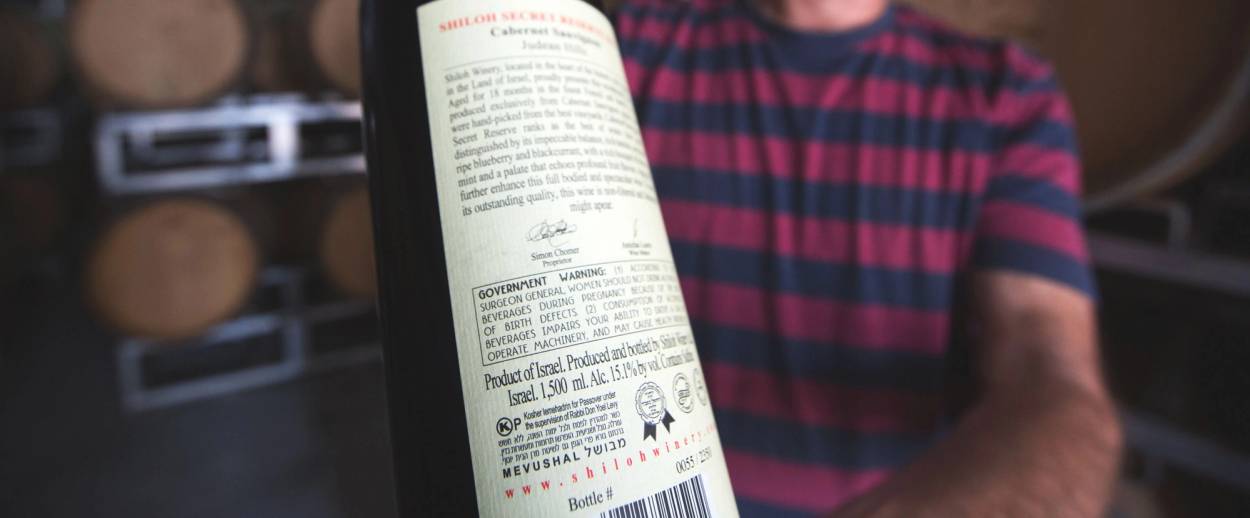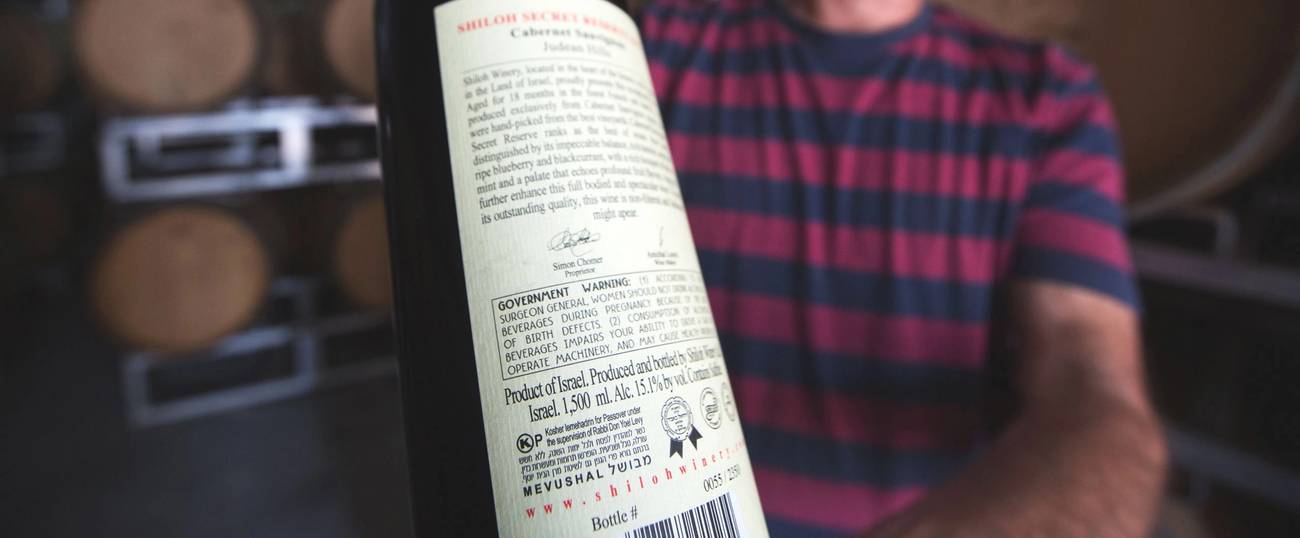The Green Line on the Label
How a U.S. Senator’s fight against labeling Israeli settlement products is actually a gift to the BDS movement




European unity is a sometime thing, so perhaps it’s not surprising that two European governments have opted out from the Nov. 11, 2015, European Commission directive that forbids goods produced by Israeli settlers in East Jerusalem, on the West Bank, and the Golan Heights to be labeled “Product of Israel.” The EC directive reads:
Since the Golan Heights and the West Bank (including East Jerusalem) are not part of the Israeli territory according to international law, the indication “product from Israel” is considered to be incorrect and misleading.
Helpfully, the EC offers alternative formulations it finds acceptable: “expressions such as ‘product from the Golan Heights (Israeli settlement)’ or ‘product from the West Bank (Israeli settlement)’ could be used.”
The objecting governments are an odd couple: Greece and Hungary. Greece, of course, is left-wing. Hungary’s right-wing Prime Minister Viktor Orban proudly proclaims the virtues of being “illiberal.” Go figure. In any event, Greece’s opt-out followed a visit by left-wing Prime Minister Alexis Tsipras to Jerusalem, which, perhaps little appreciating the verbal dynamite packed into a pro-forma gesture, he referred to (in an entry in the presidential guestbook of Reuben Rivlin) as “your historic capital.” Hungary’s foreign and trade minister, Péter Szijjártó, called the EC policy “inefficient” and “irrational” and added that it “does not contribute to a solution [to the Palestinian–Israeli conflict], but causes damage.” His objection would have been more impressive if he had proposed any measure that would, by contrast, “contribute to a solution.”
The point, of course, goes beyond niggling, for most of the Europeans refuse to acknowledge that the Occupied Territories are Israel. For them, there’s no such entity as “Greater Israel.” They are standing their ground. So is the United States government, which is committed to the tautological but compelling principle that the Occupation is an Occupation, not a legally sanctioned enlargement of the state, which is bounded by the pre-1967 Green Line. Obviously the Netanyahu government disagrees.
Well, Netanyahu is not alone. If Sen. Tom Cotton (R-AK) has his way, the United States will also disagree. With the co-sponsorship of Sens. Ted Cruz and Marco Rubio, Cotton has offered a bill to permit products made on the West Bank and Gaza (!) to be labeled “Made in Israel.”
The Obama Administration’s order of Jan. 23 banning the labeling of West Bank products as “Made in Israel” actually restates an existing (but apparently inconsistently enforced) American policy that has been on the books since 1995:
It is not acceptable to mark [goods produced in the West Bank or Gaza Strip] with the words “Israel,” “Made in Israel,” “Occupied Territories-Israel,” or any variation thereof.
A spokeswoman of Customs and Border Patrol called the Jan. 23 order “simply a restatement of existing requirements and was issued in response to recent mislabeling allegations received by CBP.” This is accurate. But it would appear that the 1995 regulation was not being enforced. Hence the decision to restate it.
As Nathan Guttmann wrote in the Forward, Sen. Cotton called the Customers and Border Patrol order reiterating the often unenforced two-decade-old American policy “nonsensical” and said it “plays right into the hands of those who are driving insidious efforts to boycott Israeli goods.” Cotton said the move was an “effort to put daylight between the United States and Israel.”
Now, it is a well-known principle of international relations that states are sovereign over distinct, non-overlapping territories. By definition, there is “daylight” between them. So, it must be: This is what it means to be a sovereign state. But Sen. Cotton, elected in 2014 with Tea Party support after several years as a U.S. Army officer and one term in the House of Representatives, has a different idea. Perhaps it has something to do with the fact that his election campaign benefited from a $960,250 ad buy from the Emergency Committee for Israel, headed by longtime Republican operatives William Kristol and Gary Bauer. In the 2014 campaign, Cotton also benefited considerably from at least $825,000 furnished him by a political action committee run by George W. Bush’s former U. N. Ambassador John Bolton, which benefits from donations from the hospital tycoon and bingo king Irving Moskowitz, who invests heavily in Jewish settlements in the West Bank. As of 2002, Moskowitz’s own foundation had invested more than $70 million in settlement projects, not counting private funds funneled through his foundation. In his spare time, Moskowitz has also donated to Karl Rove’s PAC and to a proponent of “birther” conspiracies about President Obama. A Cotton spokeswoman has denied that Cotton’s views on Israel are the product of such contributions, and there is no reason to doubt her. The Tea Party is not known for adhering to international law, which is, after all, international and therefore no respecter of American exceptionalism.
Cotton is nothing if not fervent when he announces that his labeling bill deplores what it calls “an effort in some quarters around the globe to delegitimize Israel.” The Israel he considers legitimate is a Greater Israel that no nation on earth recognizes. The Supreme Court of Israel itself has referred to Israel’s seizure of the West Bank as “belligerent occupation.” But Netanyahu is hellbent on pariah status for Israel—which many nations are perfectly willing to accord it—and so the Netanyahu government and its allies in America have insisted that any political attitude that falls short of total embrace of the Occupation constitutes “delegitimization” and is therefore morally forbidden. Their response to the advances made by the BDS movement is to hew ever more tightly to precisely the policies that fuel the movement’s growth. Cotton’s idea of “standing with Israel” is to issue blank checks that will, in the end, bounce.
Cotton declares that labeling settlement products as settlement products is a gift to boycott efforts. His logic is twisted. The label makes it possible to distinguish between Israeli goods—goods produced within the Green Line—and goods produced on Occupied Territory. To deny the legitimacy of the Green Line is a gift to the BDS movement, which wants Israel to violate as much international law as possible, the better to tar it as illegitimate from the start. Such perversity satisfies only the zealots who think that God signed the West Bank over to them once and forever because soil is worth more than blood.
Correction: A previous version of this article indicated that the Emergency Committee for Israel donated directly to Sen Cotton’s 2014 campaign.
***
Like this article? Sign up for our Daily Digest to get Tablet Magazine’s new content in your inbox each morning.
Todd Gitlin (1943-2022), was a professor of journalism and sociology and chair of the Ph.D. program in Communications at Columbia University, and the author of among other books The Sixties: Years of Hope, Days of Rage; Occupy Nation: The Roots, the Spirit, and the Promise of Occupy Wall Street; and, with Liel Leibovitz, The Chosen Peoples: America, Israel, and the Ordeals of Divine Election.